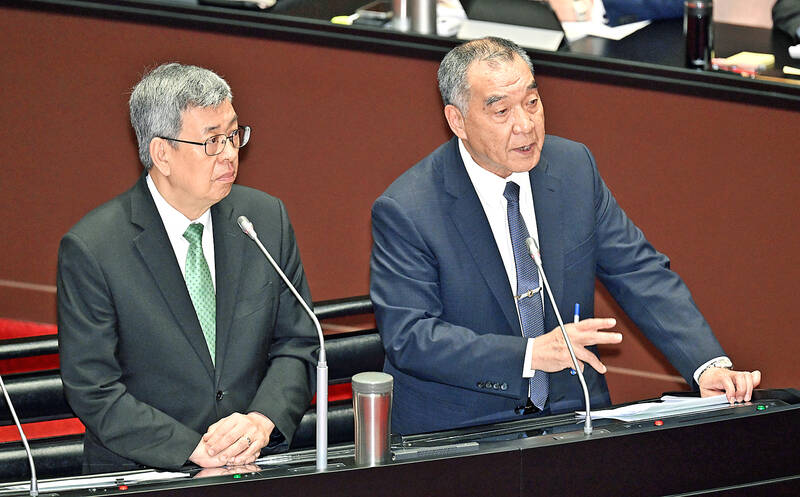Four separate cases have been opened over alleged leaks of national security secrets involving Taiwan’s submarine program, the Supreme Prosecutors’ Office said yesterday.
Admiral Huang Shu-kuang (黃曙光), who heads the Indigenous Defense Submarine program, on Thursday last week said that “certain legislators” were making it difficult for the program to purchase critical equipment.
Retired navy captain Kuo Hsi (郭璽) on the same day said that Huang was referring to Chinese Nationalist Party (KMT) Legislator Ma Wen-chun (馬文君).

Photo: Liao Chen-huei, Taipei Times
Ma allegedly leaked files from the submarine program to the Chinese Communist Party and the South Korean Mission in Taipei, Kuo added.
The Supreme Prosecutors’ Office said that the High Prosecutors’ Office would lead treason investigations.
The Taipei District Prosecutors’ Office would determine whether claims that Chinese spies or organizations affiliated with China were involved would constitute a breach of the National Security Act (國家安全法) and the Anti-infiltration Act (反滲透法), the Supreme Prosecutors’ Office said.
The Taipei office would also launch a separate investigation into disputes between contractors that submitted bids for the program, it said.
Ma has said that she was given blueprints and other files, whose authenticity was difficult to ascertain, in January last year, as well as recordings that Kuo said were of him.
Ma said she forwarded the material to the Ministry of National Defense, but it had told her the content was a result of “bad blood” between competing contractors and the information was not sensitive.
Ma said she had later asked the Ministry of Justice’s Investigation Bureau to open a probe into the matter.
She reached out to the South Korean office via the Ministry of Foreign Affairs and forwarded the recordings to it as well, she said.
The Investigation Bureau confirmed that it had received the request from Ma, a source said on condition of anonymity.
The bureau forwarded the matter to the Kaohsiung District Prosecutors’ Office, the source said.
The Supreme Prosecutors’ Office yesterday instructed the Kaohsiung office to continue its investigation.
Premier Chen Chien-jen (陳建仁) said at the Legislative Yuan that he respected ongoing investigations.
Ma asked Minister of National Defense Chiu Kuo-cheng (邱國正) why a “controversial individual” like Kuo was hired as a consultant for the submarine program.
Kuo had prior knowledge of such matters, Chiu said, adding that the navy had suspended his consultancy after a year because “he crossed some lines.”
Ma later told reporters that she was innocent of any alleged wrongdoing and that the judicial proceedings would determine the truth.
Former minister of national defense Michael Tsai (蔡明憲) called on Ma to resign and cancel her re-election campaign to demonstrate her resolve to work with the investigation.
Taiwan Statebuilding Party Chairman Wang Hsing-huan (王興煥) said that Chiu’s “appeasement” of Ma and calling her “hard-working” was incredible.
Additional reporting by Wu Su-wei

Several Chinese Nationalist Party (KMT) officials including Chairman Eric Chu (朱立倫) are to be summoned for questioning and then transferred to prosecutors for holding an illegal assembly in Taipei last night, the Taipei Police said today. Chu and two others hosted an illegal assembly and are to be requested to explain their actions, the Taipei City Police Department's Zhongzheng (中正) First Precinct said, referring to a protest held after Huang Lu Chin-ju (黃呂錦茹), KMT Taipei's chapter director, and several other KMT staffers were questioned for alleged signature forgery in recall petitions against Democratic Progressive Party (DPP) legislators. Taipei prosecutors had filed

Taiwan would welcome the return of Honduras as a diplomatic ally if its next president decides to make such a move, Minister of Foreign Affairs Lin Chia-lung (林佳龍) said yesterday. “Of course, we would welcome Honduras if they want to restore diplomatic ties with Taiwan after their elections,” Lin said at a meeting of the legislature’s Foreign Affairs and National Defense Committee, when asked to comment on statements made by two of the three Honduran presidential candidates during the presidential campaign in the Central American country. Taiwan is paying close attention to the region as a whole in the wake of a

NEW WORLD: Taiwan is pursuing innovative approaches to international relations through economics, trade and values-based diplomacy, the foreign minister said Taiwan would implement a “three-chain strategy” that promotes democratic values in response to US tariffs, Minister of Foreign Affairs Lin Chia-lung (林佳龍) said. Taiwan would aim to create a “global democratic value chain,” seek to capitalize on its position within the first island chain and promote a “non-red supply chain,” Lin was quoted as saying in the ministry’s written report to the Legislative Yuan submitted ahead of the legislature’s Foreign Affairs and National Defense Committee meeting slated for today. The Ministry would also uphold a spirit of mutual beneficial collaboration, maintaining close communication and consultations with Washington to show that Taiwan-US cooperation

Taiwan and the US have begun trade negotiations over tariffs imposed by US President Donald Trump earlier this month, Minister of Foreign Affairs Lin Chia-lung (林佳龍) said in an interview this morning before reporting to the Legislative Yuan’s Foreign Affairs and National Defense Committee. The Taipei Economic and Cultural Representative Office (TECRO), Taiwan’s de facto embassy in the US, has already established communication channels with the US Department of State and the US Trade Representative (USTR), and is engaging in intensive consultations, he said. Points of negotiation include tariffs, non-tariff trade barriers and issues related to investment, procurement and export controls, he